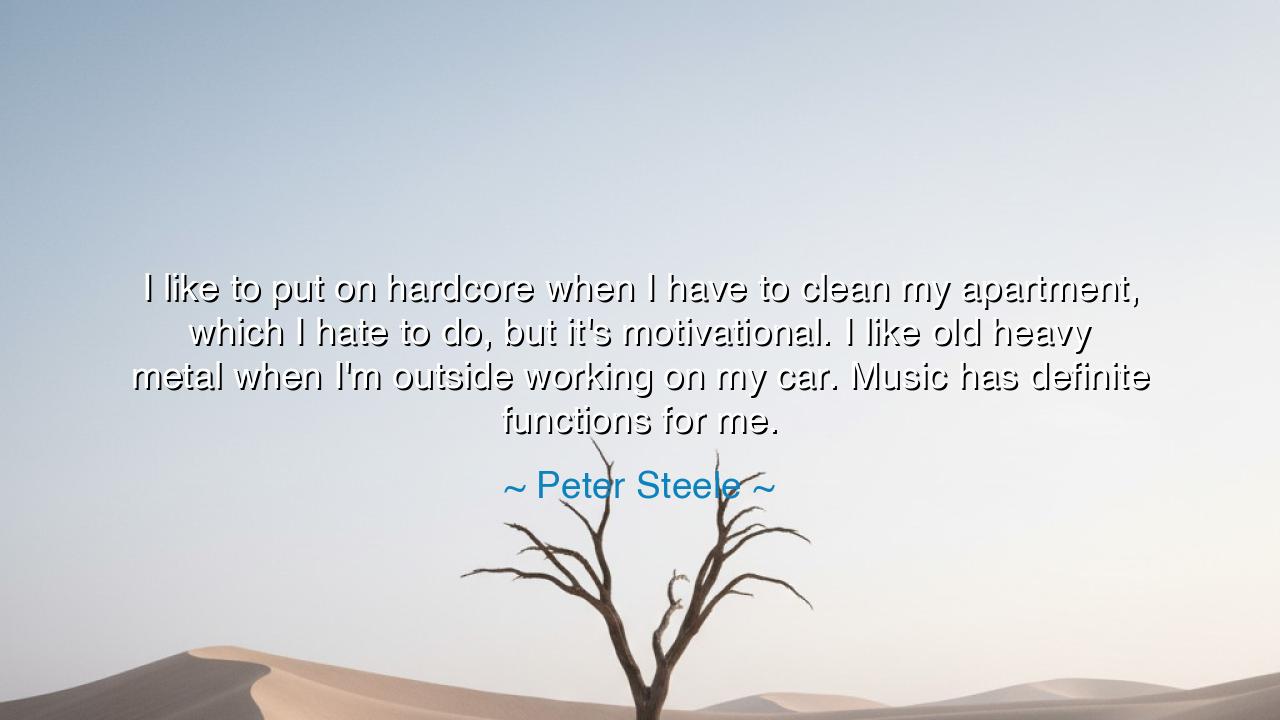
I like to put on hardcore when I have to clean my apartment
I like to put on hardcore when I have to clean my apartment, which I hate to do, but it's motivational. I like old heavy metal when I'm outside working on my car. Music has definite functions for me.






Hear the words of Peter Steele, poet of darkness and sound, who declared with raw honesty: “I like to put on hardcore when I have to clean my apartment, which I hate to do, but it's motivational. I like old heavy metal when I'm outside working on my car. Music has definite functions for me.” This confession, though clothed in the simplicity of daily life, carries the weight of eternal wisdom: that music is more than entertainment—it is a tool, a force, a companion that shapes the spirit and lends power to even the most ordinary of tasks.
At the heart of this truth lies the recognition that music is a function of the soul. In ancient times, the Greeks spoke of music as an echo of the harmony of the spheres, believing that sound itself could heal, inspire, or guide men to valor. Warriors marched to the drum, harvesters sang in the field, and mourners lifted laments to ease grief. Steele’s words are the modern reflection of this ancient wisdom: when he faces the hated drudgery of cleaning, hardcore becomes his fire; when he tends to the work of hands beneath the hood of a car, heavy metal is his forge. Music, for him, is not passive—it is a weapon against reluctance, a rhythm that carries him forward.
Consider the armies of Rome, who never entered battle without the blare of horns and the thunder of drums. These sounds did not win the war by themselves, but they moved the spirit, awakening courage where fear might have lived. So too with Steele: though he may laugh at the mundane nature of cleaning or car work, he acknowledges that music transforms the spirit within him, making the unpleasant bearable, and the difficult achievable. This is the ancient purpose of song—to empower the human heart in its labors.
Steele also speaks to a deeper truth: music is not one sound for all occasions, but many sounds for many moods. Just as the seasons of the earth change, so too do the seasons of the spirit. He does not call upon the same song for every task; he knows that different functions require different melodies. The thunder of hardcore drives him to action when reluctance tempts him toward idleness, while the rugged power of old metal aligns with the grease and grit of the mechanic’s work. Here we see not only taste, but wisdom—the recognition that life requires a soundtrack that adapts to its many faces.
This lesson is mirrored in history. Think of the laborers who built the pyramids of Egypt, who sang rhythmic chants as they pulled great stones across the sands. The songs did not move the stones themselves, but they moved the workers’ hearts, uniting their steps, lightening their burdens, and giving meaning to toil. Without music, the labor might have crushed them; with it, they endured. Steele’s truth is the same: when spirit and rhythm are joined, even hated work becomes possible.
The meaning, then, is not merely about preference in music, but about the power of aligning sound with purpose. Music has always been the voice of motivation, whether to face battle, to endure labor, or to celebrate victory. To acknowledge this is to honor one of the deepest forces of human culture—that song is not decoration, but sustenance. Steele reminds us that music is the companion that makes life bearable, that transforms monotony into rhythm, resistance into momentum.
What, then, must we take away? It is this: choose your music with intention. Do not let it wash over you without thought. Recognize that music is a tool, a medicine, a spark. When weary, find the sound that renews you. When reluctant, find the rhythm that drives you forward. When joyous, find the song that magnifies your spirit. Let music serve your life’s functions, as Steele declared, and you will find that even the most despised task can be faced with strength.
Thus, let it be remembered: music is more than sound—it is the breath of labor, the fire of courage, the rhythm of life itself. From the ancients to Peter Steele, its truth endures. Choose it well, wield it with purpose, and let it carry you through the struggles and triumphs of your days. For in the right song lies the power to transform not only tasks, but the very heart that performs them.






AAdministratorAdministrator
Welcome, honored guests. Please leave a comment, we will respond soon